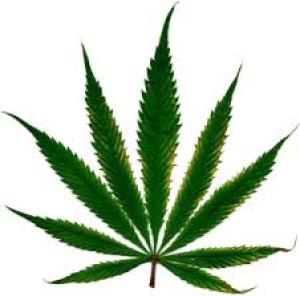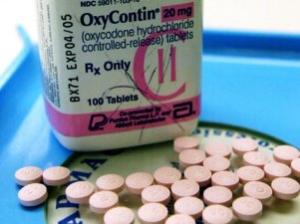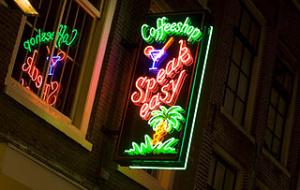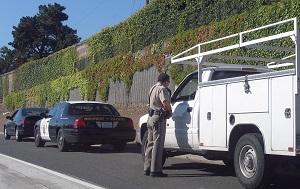You would think that, as legalization and decriminalization spread, the number of marijuana arrests would be going down. You would be wrong.
The California Coalition for Cannabis Policy Reform is finally going to submit initiative language to state officials, and they have the resources to make it happen.
Decriminalization makes a difference in more ways than one.
Last week's reservation raid in California reverberates, dispensaries move a step closer in Maryland, a medical marijuana bill advances in South Carolina, and more.
A criminal gang of Puerto Rican cops gets indicted, prison guards run wild all over the country, and more cops get in trouble for stealing dope and cash.
An increasing majority supports marijuana legalization in Vermont, a second Wisconsin Indian tribe moves toward allowing marijuana, a major national drugstore chain makes naloxone available over the counter, and more.
The issue of cannabis social clubs is bubbling up in Alaska and Colorado, a second Massachusetts legalization initiative gets ready to collect signatures, Oklahomans really don't like asset forfeiture, and more.
The pope criticized the drug war at the UN, the president addresses overdoses and addiction in his weekly address, marijuana arrests jumped last year, a campaign to bring safe injection sites to New York City is launching, and more.
Half of Oregon's dispensaries will start selling marijuana to any adult beginning this week, the FDA fires back at critics of its pediatric prescribing rules for Oxycontin, a high UN official lists the ways the drug "problem" impacts human rights, and more.
Puerto Rico decriminalizes, polls in Texas and Canada show strong majorities for marijuana law reform, Ohio and Michigan are moving on asset forfeiture reform, DEA agents flunk drug tests with few consequences, and more.
Despite marijuana legalization being in effect in two states last year and decriminalization laws in nearly 20 more, the number of marijuana arrests actually increased last year, according to data from the FBI's annual Uniform Crime Report.
Pot arrests accounted for nearly 45% of all drug arrests, which totaled 1.56 million last year. Drug arrests were the single largest category of offenses. There were three times as many drug arrests last year as there were arrests for violent crimes.
There were 700,993 marijuana arrests in 2014, compared with 693,000 in 2013. More than 88% of those arrests were for simple possession -- also an increase over 2013, by 2%.
Last year, people were being arrested for marijuana offenses at a rate of one every 45 seconds. That compares with one every half hour in 1965 and one every two minutes in 1990, when marijuana arrests really started skyrocketing. In that year, there were some 330,000 pot arrests; they peaked in 2007, with nearly 900,000. Last year's number represent a 20% decline from the 2007, but is still an increase over 2013.
The spread of legalization and decriminalization in the West is reflected in the numbers. Marijuana arrests were more likely to occur in the Midwest and South, while many fewer arrests were reported in the West.
Marijuana reform advocates were quick to denounce the uptick.
"These numbers refute the myth that nobody actually gets arrested for using marijuana. Could you imagine if hundreds of thousands of adults were arrested last year simply for possessing alcohol? That would be crazy. It's even crazier that hundreds of thousands of adults were arrested for possessing a less harmful substance," said Mason Tvert, director of communications for the Marijuana Policy Project.

Marijuana busts can happen at home, at a concert, on the sidewalk, when driving...
"It's hard to imagine why more people were arrested for marijuana possession when fewer people than ever believe it should be a crime,"
Tvert continued. "Law enforcement officials should not be wasting their time and resources arresting and prosecuting adults for using marijuana. While law enforcement was busy making nearly three quarters of a million marijuana arrests, more than 35% of murders went unsolved, the clearance rate for rape was less than 40%, and for robbery and property crimes, it was below 30%."
"It's unacceptable that police still put this many people in handcuffs for something that a growing majority of Americans think should be legal," said Tom Angell, chairman of Marijuana Majority. "A record number of states are expected to vote on legalizing marijuana next year, so we hope and expect to see these numbers significantly dropping soon. There's just no good reason that so much police time and taxpayer money is spent punishing people for marijuana when so many murders, rapes and robberies go unsolved."
The numbers should decrease next year. By the end of 2016, legalization will have been fully in effect in Alaska, DC, and Oregon, as well as in Colorado and Washington, where it was in effect all of last year. But for the numbers to have gone up last year even as legalization and decriminalization expanded across the country strongly suggests that enforcing the marijuana laws continues to be a favorite pastime for law enforcement.
back to top
This article was produced in collaboration with AlterNet and first appeared here.
The long-awaited marijuana legalization initiative from the Coalition for Cannabis Policy Reform, also known as ReformCA, is about to be filed with state officials. Backers of the initiative told the LA Weekly Tuesday that language for circulation will be filed with the attorney general's office in a matter of "days."

Here comes ReformCA! (reformCA.com)
There are a handful of legalization initiatives
already filed and some already approved for signature gathering, but there is little sign that any of them have the financial and organizational resources to actually make the ballot. It takes some 365,000 valid voter signatures to qualify, a number that virtually demands paid signature gatherers at a cost that could approach a million dollars.
The ReformCA campaign, on the other hand, has the backing of both powerful and deep-pocketed national groups as the Drug Policy Alliance and the Marijuana Policy Project, as well as major state drug reform, civil rights, and labor groups, including the California NAACP and the United Food and Commercial Workers.
ReformCA has spent more than a year drafting final language after consultations with players across the board, from marijuana consumers, growers, and advocates in a series of public meetings across the state, as well as listening to the positions of law enforcement, public health, and local officials.
Drafting was delayed this summer as ReformCA waited to digest the recommendations of pro-legalization Lt. Gov. Gavin Newsom's Blue Ribbon Commission on Marijuana Policy, finally released in July, and again this month when the state legislature actually got around to passing comprehensive, statewide medical marijuana regulation. That required ReformCA to try to ensure that the initiative wouldn't bump up against the new regs.
"This has taken longer than we wanted," said Dale Gieringer, long-time head of California NORML, and a spokesman for ReformCA.
Details are vague at this point, although ReformCA says it intends to tax and regulate marijuana like alcohol, and its seven principles provide a general idea of what the initiative is going to look like. They include legalizing personal possession "in limited amounts," creating tax revenues from "legal cannabis business and sales," allowing "limited personal cultivation," and allowing "adults to consume on private property where allowed," an apparent reference to cannabis social clubs.
Gieringer said we're likely to see the proposed initiative language filed twice, once so the public can review it and suggest changes, and again after changes have been incorporated.
The big one is coming. The ReformCA initiative should have the resources behind it to make the ballot, and it should have enough public -- and financial -- support behind it to actually pass in November 2016. Then, one-eighth of the nation will have gone green in one fell swoop.
back to top
This article was produced in collaboration with AlterNet and first appeared here.
Civil rights advocates and marijuana legalization supporters are welcoming a decision from the state Supreme Judicial Court that says police can't stop motorists solely because they suspect the vehicle's occupants are carrying marijuana. The decision came in
Commonwealth v. Rodriguez.
The Rodriguez in question was Elivette Rodriguez, who was a passenger in a car stopped by New Bedford police in 2012 after they allegedly detected the smell of marijuana coming from the vehicle. During the stop, police found a bag containing 60 Percocet pills, and Rodriguez was charged with possession of a Class B substance with intent to distribute, as well as other offenses.
Before trial, Rodriguez filed a motion to suppress the evidence from the search, arguing that since the state had decriminalized the possession of small amounts of marijuana in 2008, the mere odor of marijuana coming from the car did not create sufficient probable cause to undertake the traffic stop and subsequent search. The trial judge denied that motion, but put the trial on hold while Rodriguez appealed his decision. The Supreme Judicial Court on its own initiative took the case from the appeals court.
In its ruling Tuesday, leaning heavily on the 2008 decriminalization law, the Supreme Judicial Court agreed with Rodriguez. "Permitting police to stop a vehicle based on reasonable suspicion that an occupant possesses marijuana does not serve [the] objectives" of the law, Justice Margot Botsford wrote for the majority. Allowing such stops "does not refocus police efforts on pursing more serious crime," another goal of the law, she wrote.
The court's 5-2 majority ruled that the pills were inadmissible in court because they were "fruit of the poisoned tree," in the classic formulation. In other words, the evidence resulted from an illegal search and thus must be thrown out. Rodriguez' drug case was referred back to district court for "further proceedings consistent with this opinion," but since they now have no evidence against her, prosecutors said they would drop the case.
In arguing the case, Bristol prosecutors had asserted that police can stop vehicles for a civil marijuana offense, just as they can for a civil traffic offense, but the court rejected that argument. While traffic laws are designed to promote road safety, "there is no obvious and direct link" between marijuana possession and maintaining highway safety.
"The high court was making a statement "about how the police ought to spend their time and the taxpayers' money," ACLU of Massachusetts legal director Matthew Segal told the Boston Globe. Pulling over a vehicle for suspicion of marijuana possession "is not consistent with the Massachusetts constitution, nor is it consistent with the will of the voters who passed decriminalization," he said.
The Campaign to Regulate Marijuana Like Alcohol, one of two groups undertaking marijuana legalization initiative campaigns in the state (the other is Bay State Repeal), was also pleased with the decision. In a statement, campaign spokesman Jim Borghesani said the "provides further clarification for how police officers should handle vehicle stops in the era of decriminalization, and it advances the clear message sent by voters in 2008 to refocus police activity on more serious crimes."
back to top
Last week's reservation raid in California reverberates, dispensaries move a step closer in Maryland, a medical marijuana bill advances in South Carolina, and more.
CaliforniaLast Friday, the Pinoleville Pomo Nation responded to a raid on its collective grow operation. The tribe said Mendocino County Sheriff Tom Allman "overstepped his authority, violated tribal sovereignty, and acted outside of his legal jurisdiction" in the raid last Tuesday, in which deputies "seized and destroyed property that belonged to the tribe's cannabis collective." Allman argued that the operation was illegal because it was for profit, but the tribe says it will "seek all legal remedies against the Mendocino County Sheriff's Office" for damages from the raid.
Maryland
Last Thursday, the attorney general's office clarified that counties cannot ban dispensaries. Faced with an effort by Anne Arundel County Executive Steve Schuh to ban medical marijuana facilities in the county, the office of the attorney general issued a non-binding legal opinion saying that while state law allows counties to decide where such facilities may locate, it does not allow them to ban them.
On Monday, the state began taking applications for medical marijuana businesses. The Maryland Medical Cannabis Commission is accepting applications for state licenses for growers, processors, and dispensaries. The commission will issue 15 licenses for growers, up to 92 for dispensaries, and an unlimited number for processors. The deadline for applications is November 6, and dispensaries could be stocked and open by next fall. Click on the commission link for more details.
Minnesota
Last Friday, lawmakers and regulators got an earful from patients at a hearing. The task force overseeing the state's medical marijuana program heard from patients and providers at a hearing last Friday, with complaints about high prices and logistical problems getting lots of attention. Click on the link for more details.
South Carolina
Last Thursday, a medical marijuana bill won a Senate panel vote. A Senate Medical Affairs Subcommittee today approved Senate Bill 672 a full-fledged medical marijuana bill. The vote was unanimous. The bill will head to the full committee early next year. The state approved a CBD cannabis oil bill last year.
Oregon
Beginning Thursday, some dispensaries will start selling to non-medical users. More than half of the state's 345 medical marijuana dispensaries have told the Health Authority they plan to sell recreational marijuana starting Thursday, October 1. Recreational marijuana has been legal in the state since July 1, but recreational pot shops won't be open until next year, so the state is allowing dispensaries to fill the void.
[For extensive information about the medical marijuana debate, presented in a neutral format, visit MedicalMarijuana.ProCon.org.]
back to top
A criminal gang of Puerto Rican cops gets indicted, prison guards run wild all over the country, and more cops get in trouble for stealing dope and cash. Let's get to it:
In Shamokin, Pennsylvania, a state prison guard was arrested last Wednesday for allegedly smuggling cell phones and marijuana into the prison. Damond Lamar Johnson is charged with possession of a controlled substance and contraband, conspiracy, and criminal use of a telecommunications device. He went down after he was found with marijuana during a pre-shift search and later confessed to other instances of smuggling pot and cell phones into the joint.In Jackson, Mississippi, a Jackson police officer was arrested last Thursday on charges he was aiding some local drug dealers by pulling over their rivals and seizing their cash during illegal stops. Officer Bryan Jones went down after a tip from the community. He's been charged with extortion. He's looking at up to 20 years in federal prison.
In Atlanta, a former Georgia prison guard was indicted last Thursday on charges related to the use of cell phones to facilitate drug trafficking and other crimes behind bars. Anekra Artina Williams, 20, a guard at Valdosta State Prison, was charged with extortion and distributing methamphetamine and extortion. She is one of a dozen people rounded up in the federal bust, including current and former inmates and a prison cafeteria worker.
In San Juan, Puerto Rico, 10 police officers were indicted last Friday for allegedly participating in a criminal organization run out of the police department. They are accused of using their positions to make money through selling drugs, robbery, extortion, and manipulating court records. The officers are Shylene López-GarcÃa aka "Plinia"; Ãngel Hernández-Nieves, aka "Doble"; Xavier Jiménez-MartÃnez, aka "Negro"; Alvin Montes-Cintrón, aka "Vinillo"; Ramón Muñiz-Robledo, aka "Marmota"; Guillermo Santos-Castro, aka "Caco Biftec"; Luis Flores-Ortiz, aka "Piquito"; José Neris-Serrano; Manuel Grego-López; and David Centeno-FarÃa, aka "David Bisbal." They are charged with conspiracy to violate the RICO Act, as well as extortion, drug trafficking, civil rights violations, and making false statements.
In State College, Pennsylvania, a former State College police officer was sentenced last Friday to 23 months in jail for stealing drugs from the evidence room. Thomas Dann, 56, stole cocaine and prescription medications while serving as the evidence room custodian, and originally faced dozens of counts. He pleaded guilty to four counts of felony acquisition of a controlled substance by fraud for stealing three pounds of cocaine, as well as dozens of prescription opioids.
In Baltimore, a former jail guard was sentenced last Friday to six years in prison for his role in a Baltimore jail racketeering conspiracy. Travis Paylor, 27, is one of 40 people convicted in the wide-ranging prison corruption case involving the Black Guerrilla Family and got the longest sentence because he continued to engage in illegal activity even after he was charged. He was convicted of smuggling contraband, including drugs, into the prison.
In Los Angeles, a former LAPD officer pleaded no contest Tuesday to offering to sell drugs to an undercover officer last year. Randolph Agard pleaded guilty to two counts of possession for drugs for sale, and was sentenced to 480 hours of community service and three years' probation. Agard had responded to an online ad seeking drugs placed by police. When he arrived at a meeting place, he was arrested by LAPD narcs, who found 20 hydrocodone tablets in his pocket and 35 more in his car.
back to top
An increasing majority supports marijuana legalization in Vermont, a second Wisconsin Indian tribe moves toward allowing marijuana, a major national drugstore chain makes naloxone available over the counter, and more.

Public opinion appears headed to making Vermont a Green Bud state as well as a Green Mountain state. (wikimedia.org)
New Vermont Poll Has Support for Legalization at 56%. A new Castleton Polling Institute survey has majority support for legalization, and it's up two points from the same poll earlier this year. The poll comes as state lawmakers prepare an effort to become the first state to legalize marijuana through the legislative process. Click on the poll link for more details and demographic and methodological information.
Washington State Merger of Medical Marijuana Into Legal Sales System Advances. The state is folding medical marijuana into the legal marijuana system, and the state Liquor and Cannabis Control Board announced Wednesday it will accept applications for new retail stores for the first time since 2013 beginning on October 12. Existing, non-licensed dispensaries will have a chance to apply for sales licenses; those without a sales license will have to shut down by next July.
Second Wisconsin Tribe Moves to Okay Marijuana on the Rez. The Ho-Chunk Nation tribal council voted over the weekend to end a policy that made marijuana use and sale on tribal lands illegal. The Ho-Chunks say that is just the first step on a path toward possible marijuana sales on tribal lands. Last month, the Menominee Nation also endorsed the possible legalization of weed.
Medical Marijuana
Maryland Attorney General's Office Clarifies That Counties Cannot Ban Dispensaries. Faced with an effort by Anne Arundel County Executive Steve Schuh to ban medical marijuana facilities in the county, the office of the attorney general has issued a non-binding legal opinion saying that while state law allows counties to decide where such facilities may locate, it does not allow them to ban them.
South Carolina Medical Marijuana Bill Wins Senate Panel Vote. A Senate Medical Affairs Subcommittee today approved Senate Bill 672, a full-fledged medical marijuana bill. The vote was unanimous. The bill will head to the full committee early next year. The state approved a CBD cannabis oil bill last year.
Harm Reduction
CVS Will Make Overdose Reversal Drug Available Without Prescription in 12 More States. The CVS pharmacy chain announced Wednesday that it will make available without prescription the anti-overdose drug naloxone (Narcan) to opiate users, friends, and family members. "Over 44,000 people die from accidental drug overdoses every year in the United States and most of those deaths are from opioids, including controlled substance pain medication and illegal drugs such as heroin," Tom Davis, vice president of pharmacy professional practices at CVS, said in a statement. "Naloxone is a safe and effective antidote to opioid overdoses and by providing access to this medication in our pharmacies without a prescription in more states, we can help save lives." Wednesday's announcement will affect CVS pharmacies in Arkansas, California, Minnesota, Mississippi, Montana, New Jersey, North Dakota, Pennsylvania, South Carolina, Tennessee, Utah and Wisconsin. The chain already provides the drug without prescription in Massachusetts and Rhode Island.
International
Pakistan Targets Marijuana Cultivators in Bid to Assert Control, Fight Extremists. Peasant marijuana cultivators in the country's wild and remote Northwest territories are being squeezed by a military and paramilitary effort to exert effective control over the area and stamp out extremism. The authorities view the marijuana trade as a source of financing for the radicals, but it's also a lifeline for impoverished locals. Click on the link for an extensive report.
back to top
The issue of marijuana social clubs is bubbling up in Alaska and Colorado, a second Massachusetts legalization initiative gets ready to collect signatures, Oklahomans really don't like asset forfeiture, and more.

A conference on psychedelics is coming to New York City next month.
Federal Bill Would End Students Losing Financial Aid for Getting Caught With a Joint. Rep. Earl Blumenauer (D-OR) has filed HR 3561, which would protect students who get arrested for misdemeanor marijuana possession offenses from losing access to financial aid. Under the 1998 version of the Higher Education Act (HEA), students with drug convictions lost financial aid, but that law was later walked back to apply only to students in school and receiving financial aid at the time of their offense. Blumenauer's bill would exempt students caught with marijuana from that punishment.
Alaska Set to Ban Cannabis Social Clubs. The state Marijuana Control Board has accepted draft language that would ban businesses allowing on-site pot smoking. The board said such businesses are not a type that was specified in the initiative that legalized marijuana in the state. If Alaskans want marijuana social clubs, it will now be up to them to convince the legislature to create legal space for them.
Colorado Bill Will Allow Marijuana Social Clubs. Rep. Kit Loupe (R-Colorado Springs) says he has drafted a bill that would create a retail marijuana club license. Marijuana users would be allowed to consume at the club, and the clubs could also serve alcohol and food, if licensed to do so. He says he will introduce the bill when the legislature convenes in January.
Second Massachusetts Legalization Initiative Campaign Kicks Off Tomorrow. It's the 26th Annual Boston Freedom Rally this weekend, and Bay State Repeal is using the occasion to launch the signature gathering drive for its legalization initiative. Another initiative campaign, the Marijuana Policy Project-affiliated Campaign to Regulate Alcohol Like Marijuana, got going on signature-gathering earlier this week.
Medical Marijuana
Oregon Seeking Members for Medical Marijuana Task Force. The state Health Authority's Public Health Division said Thursday it is seeking applicants to serve on a newly created Task Force on Researching the Medical and Public Health Properties of Cannabis (the Cannabis Research Task Force). Those interested need to fill out this form by September 30.
Heroin and Prescription Opiates
Massachusetts Opioid Abuse Bill Would Mandate Screening of School Students. A wide-ranging bill to deal with heroin and opiate use being finalized by state Senate leaders would include mandatory drug screening of junior and high school students. While it is only a drug "screening," not a drug test, the provision is raising privacy and confidentiality concerns among some lawmakers. Click on the link for more discussion.
Psychedelics
Psychedelics Conference in New York City Next Month. The annual Horizons: Perspectives on Psychedelics conference will take place in New York City on October 9-11. "In recent years, a growing community of scientists, doctors, artists, activists, seekers and scholars has orchestrated a renaissance in psychedelic thought and practice. Horizons is a unique forum that brings together the brightest minds and the boldest voices of this movement to share their research, insights and dreams for the future," according to the Drug Policy Alliance, which is a partner in the conference. Click on the links for more information.
Asset Forfeiture
Oklahoma Poll Has Overwhelming Support for Civil Asset Forfeiture Repeal. A new SoonerPoll shows strong public antipathy toward asset forfeiture and strong support for ending asset forfeiture without a criminal conviction. Some 70% said they would support "legislation that would allow law enforcement only to keep property when a criminal conviction is achieved" and 78% said they agreed that "law enforcement keeping confiscated property without a conviction denies those of their constitutional right of due process is un-American." The poll comes as the legislature ponders asset forfeiture reform.
Drug Policy
Massachusetts Senate Passes Bill to Repeal Drivers' License Suspensions for Non-Driving Drug Offenses. The state is one of handful that still maintain such laws, but perhaps for not much longer. Senate Bill 2014 has passed the Senate and now heads to the House.
International
Argentine Presidential Candidates Ignore Experts, Call for More Drug War. The top three hopefuls in this year's presidential race -- Sergio Massa, Mauricio Macri, and Daniel Scioli -- all are calling for a tougher drug war, but Argentine scholars and experts say they are only deepening failed policies. More than a hundred scholars have signed a document, The Drug Issue in Argentina, that says maintaining, let alone deepening, existing prohibitionist policies is not the right way to go. Click on the links for more.
Tomorrow is the Anniversary of the Disappearance of Mexico's Ayotzinapa Students. A year ago Saturday, 43 students from a teachers college went missing in Iguala, Guerrero. They still haven't been found, and their disappearance has revealed links between local politicians, local law enforcement agencies, and drug gangs in a scandal that has severely tarnished the reputation of President Enrique Pena Nieto. The families are keeping the pressure on. Click on the link for more.
back to top
The pope criticizes the drug war at the UN, the president addresses overdoses and addiction in his weekly address, marijuana arrests jumped last year, a campaign to bring safe injection sites to New York City is launching, and more.

Pots busts jumped last year. Why?
Minnesota Lawmakers Get Earful from Patients at Hearing. The task force overseeing the state's medical marijuana program heard from patients and providers at a hearing last Friday, with complaints about high prices and logistical problems getting lots of attention. Click on the link for more details.
Drug Policy
Pope Francis Criticizes War on Drugs. During his address to the United Nations last Friday, Pope Francis turned from criticizing "systemic violence" in places like Syria and Ukraine to addressing violence linked to drug prohibition -- although without calling it that. "Along the same lines I would mention another kind of conflict which is not always so open, yet is silently killing millions of people. Another kind of war experienced by many of our societies as a result of the narcotics trade," Pope Francis said. The drug war is failing, the pontiff said, and it brings dire consequences. "[It is] a war which is taken for granted and poorly fought. Drug trafficking is by its very nature accompanied by trafficking in persons, money laundering, the arms trade, child exploitation and other forms of corruption," he continued. Click on the link for a full transcript of his remarks.
President Obama Uses Weekly Address to Talk About Preventing Substance Abuse. Obama used his weekly radio address last Saturday to encourage people to participate in "National Drug Take-Back Day" that same day, warning that too many Americans are dying of drug overdoses. "More Americans now die every year from drug overdoses than they do in car crashes," he said. "And most of those deaths aren't due to drugs like heroin or cocaine, but rather prescription drugs." Click on the link for a full transcript of the president's address.
International Drug Policy Conference in DC in November. The Drug Policy Alliance is hosting the world's premier drug policy conference in suburban Washington, DC, on November 18-21. Click on the link for much more information.
Harm Reduction
Campaign for Supervised Injection Sites Coming to New York City. The Open Society Foundation will host a town hall Wednesday on innovative solutions to public drug use and overdosing, including supervised injection sites. It's the opening salvo in a campaign to bring such sites to New York City. While a proven harm reduction measure, no such sites currently operate in the United States. Click on the link for more.
Law Enforcement
Nationwide Marijuana Arrests Jumped Last Year. The FBI has released its annual Uniform Crime Report. The report shows that nearly 701,000 people were arrested for marijuana offenses in 2014, up from 693,000 the previous year. Nearly 90% of all arrests were for possession.
International
United Nations Will Monitor Honduras War on Drug Gangs. The UN will open a human rights monitoring office in Honduras to monitor potential human rights violations by security forces as they pursue their war on drug gangs, President Juan Hernandez said Sunday. Hernandez and his predecessor, Porfirio Lobo, have increasingly relied on the military to fight gangs, and complaints about human rights violations have been piling up.
Bolivian Drug Law Reforms Would Reduce Penalties for "Microtraffickers," Consumers. The government of President Evo Morales has proposed reforms of the country's drug laws that would cut sentences for consumers and small-time traffickers. The proposal has been sent to the Legislative Assembly. Click on the link to read more in Spanish.
back to top
Half of Oregon's dispensaries will start selling marijuana to any adult beginning this week, the FDA fires back at critics of its pediatric prescribing rules for Oxycontin, a prominent UN official lists the ways the drug "problem" impacts human rights, and more.

The FDA counters critics who say its rules for pediatric prescribing will increase availability. (wikipedia.org)
Florida Legalization Bill Filed. Rep. Michelle Rehwinke Vasilinda (D-Tallahassee) has introduced a bill to legalize marijuana. The measure is House Bill 4021. This is the second time she has filed the bill.
Oregon Dispensaries to Start Selling to Recreational Users This Week. More than half of the state's 345 medical marijuana dispensaries have told the Health Authority they plan to sell recreational marijuana starting Thursday, October 1. Recreational marijuana has been legal in the state since July 1, but recreational pot shops won't be open until next year, so the state is allowing dispensaries to fill the void.
Medical Marijuana
Maryland Now Taking Applications for Medical Marijuana Businesses. As of Monday, the Maryland Medical Cannabis Commission is accepting applications for state licenses for growers, processors, and dispensaries. The commission will issue 15 licenses for growers, up to 92 for dispensaries, and an unlimited number for processors. The deadline for applications is November 6, and dispensaries could be stocked and open by next fall. Click on the commission link for more details.
Heroin and Prescription Opiates
FDA Rejects Critics on Oxycontin for Youth. In response to critics including US senators, the Food and Drug Administration (FDA) has defended its decision last month to allow the prescribing of the powerful opioid to pediatric patients. Critics accused the agency of expanding access to the drug, but the FDA said doctors could already prescribe Oxycontin to pediatric patients and the agency was merely setting prescribing standards. "It's important to stress that this approval was not intended to expand or otherwise change the pattern of use of extended-release opioids in pediatric patients," said FDA spokesman Eric Pahon said in a statement. "Doctors were already prescribing it to children, without the safety and efficacy data in hand with regard to the pediatric population."
Drug Policy
UN Official Says Drug "Problem" Violates Human Rights in Five Areas. UN Deputy Commissioner for Human Rights Flavia Pansieri said Monday that the global drug "problem" violates human rights in the areas of the right to health, rights relating to criminal justice and discrimination, the rights of the child, and the rights of indigenous peoples. "It is clear that the world's drug problem impacts the enjoyment of a wide range of human rights, often resulting in serious violations," said Pansieri, "It is, nevertheless, a positive development that human rights are increasingly being taken into account in the preparations for the General Assembly's Special Session on the world drug problem to be held in April 2016." The remarks came during her report to the High Commissioner on Human Rights.
Harm Reduction
New York Governor Signs Bill to Expand Opiate Maintenance in Drug Courts. Gov. Andrew Cuomo (D) last Friday signed into law Senate Bill 4239, which prohibits drug court judges from forcing defendants to withdraw from opiate maintenance treatments as a condition of avoiding prison. Click on the title link for more details.
International
New Zealand Activists Call for Party Pill Drug Testing. The New Zealand Drug Foundation is calling on the government to legalize pill testing services. Foundation Executive Director Ross Bell said it was only a matter of time until someone died taking pills of unknown provenance. He added that the government routinely tests drugs for criminal justice purposes, and that those results should be made available as a public health measure. The government said it hadn't considered pill testing, but was open to the possibility in the future.
back to top
Puerto Rico decriminalizes, polls in Texas and Canada show strong majorities for marijuana law reform, Ohio and Michigan are moving on asset forfeiture reform, DEA agents flunk drug tests with few consequences, and more.

The Dutch Supreme Court says foreigners can be banned from cannabis cafes, but the cafes don't seem to be paying attention.
Puerto Rico Decriminalizes Possession of Up to Six Grams. Gov. Alejandro Padilla Garcia Monday signed an executive order decriminalizing the possession of up to six grams of marijuana. Instead of criminal proceedings, people caught with small amounts of pot will be subject to a fine, or possibly drug treatment. The governor cited the high cost of prosecuting small-time offenders.
Texas Poll Has Three-Quarter Support for Marijuana Reform. Nearly three out of four Texans are ready to liberalize the state's marijuana laws, according to a new Texas Lyceum Poll. The poll had support for legalization at 46%, with another 28.5% supporting decriminalization. That's 74.5% for liberalization. Only 19.5% opposed both legalization and decriminalization. Clink on the link for more poll details and methodology.
Asset Forfeiture
Michigan Attorney General Backs Asset Forfeiture Reforms. Attorney General Bill Schuette (R) is supporting a package of civil asset forfeiture reform bills. The bills, which have already passed the House, wouldn't entirely eliminate civil asset forfeiture, but would increase the burden of proof on law enforcement to keep seized property and would require more transparency. "On this issue of forfeiture and transparency, as a lawyer and as attorney general, I'm in support of these seven bills," Schuette said Tuesday during a press call organized by Fix Forfeiture, a national and bipartisan group advocating for reform. "This is a good effort. A good team effort."
Ohio GOP Legislators File Bill to End Civil Asset Forfeiture. Nineteen House Republicans cosponsored a bill Tuesday that would eliminate civil forfeiture under state law and only allow criminal forfeiture after a defendant is convicted of a crime. The lead sponsor is Rep. Robert McColley (R-Napoleon). The bill is not yet on the legislative website.
Law Enforcement
DEA Agents Fail Drug Tests, But Face No Serious Consequences. At least 16 DEA employees have failed drug tests, but only got short suspensions or other minor punishments, according to newly released documents. None was punished with being fired, and most were suspended for a day or two. Click on the title link for much, much more.
International
Canada Poll Has Strong Majority Supporting Marijuana Reform. A new Vote Compass poll has support for marijuana legalization at 56%, with another 30% saying they supported decriminalization. That's 86% in favor of liberalizing the country's marijuana laws. Only 14% said possession should remain a criminal offense, the position of the Conservatives in next month's elections. The Liberals are calling for legalization, while the New Democrats are calling for decrim. Click on the link for more polling details, methodology, and discussion.
Dutch Supreme Court Upholds Ban on Tourists in Cannabis Cafes. The Supreme Court ruled Tuesday that the country can ban foreign nationals from cannabis cafes because such a move does not conflict with European anti-discrimination legislation. The Supreme Court cited a 2010 European Court of Justice ruling that said restricting sales to foreigners is "justified by the objective of combating drug tourism." But the ban appears to operate mainly in the breach. A 2013 survey showed two-thirds of cannabis cafes were selling to foreigners.
back to top










